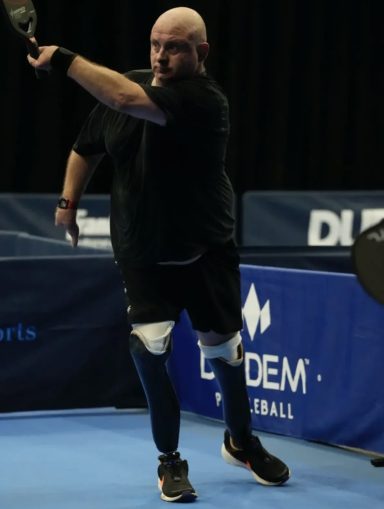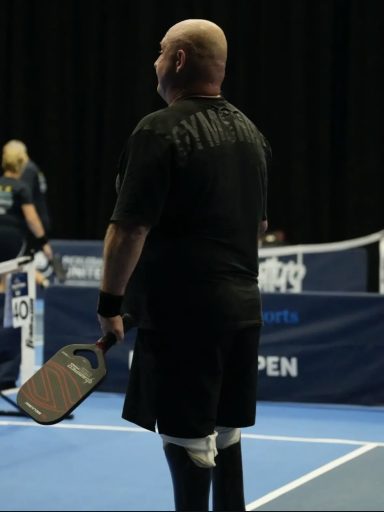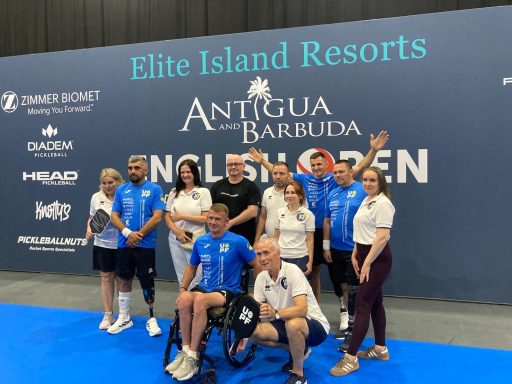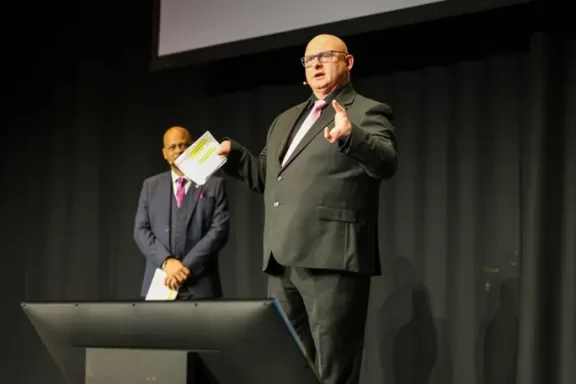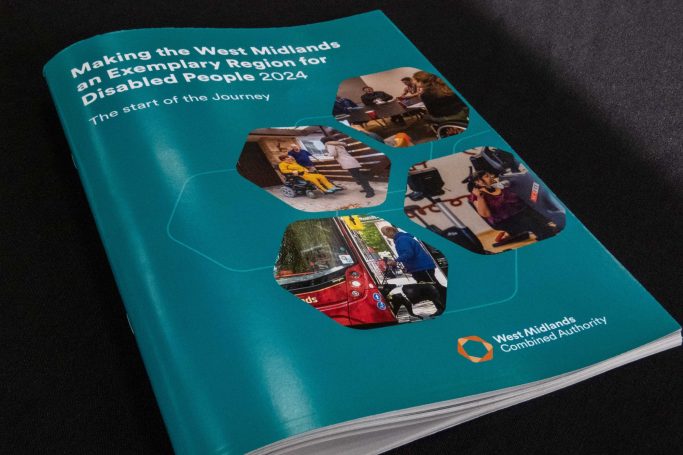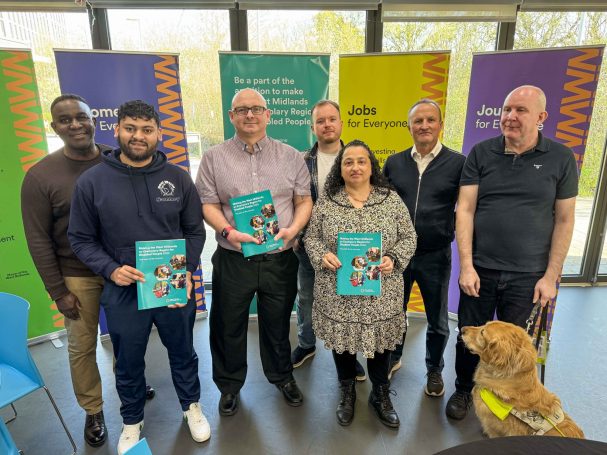Unveiling New Perspectives: Insights from Dr Mark Fosbrook
Welcome to the "Insights and Reflections" section, where the journey of understanding and empowerment unfolds. Here, you will discover enlightening articles penned by Dr Mark Fosbrook, a seasoned consultant and devoted advocate in the field of disability services. From his personal reflections on navigating the complexities of disability support to profound insights gathered through years of experience in professional coaching, this space is designed to inspire readers who seek knowledge and upliftment. Join us as we explore rich narratives that not only educate but also motivate, inviting you to engage deeply with these critical and transformative subjects.
The English Open Pickleball Championships 2025 in Telford was not just an event, but a vibrant celebration of diversity, resilience, and the transformative power of sport. Renowned as the largest pickleball tournament in the world outside the United States, this year’s event was truly monumental—spanning five exhilarating days, drawing over 2,000 participants, and bringing together athletes of all ages, backgrounds, and abilities. Yet, for me, the most profound aspect was taking my place as the sole British competitor in the inaugural Para Standing event, an experience that proved both humbling and inspiring in ways I could never have anticipated.
Breaking New Ground: The First Ever Para Standing Event
Thursday marked a historic moment for UK pickleball: the introduction of the Para Standing category. Despite the global growth of the sport, opportunities for disabled people—particularly standing players—have remained limited, often due to lack of awareness, experience, or visibility. It was no surprise, then, that the first event was small in numbers, with just seven athletes originally registered: five from Ukraine and two from Great Britain. As the day approached, we learned that one Ukrainian player hadn’t made the journey, and one of the British entrants withdrew at the last minute. That left five of us—myself representing Great Britain, and four determined athletes from Ukraine.
Karen Mitchell, CEO of Pickleball England, encapsulated the occasion with her words: “It’s you, flying the flag for GB against Ukraine.” The Ukrainian delegation was formidable, bringing with them not only standing athletes but wheelchair athletes, enthusiastic supporters, and interpreters. For a brief moment, I wondered how I would connect with my competitors. None of the Ukrainian players spoke English, and my Ukrainian, sadly, was non-existent. But with a little help from Google Translate, we built bridges, swapping stories and sharing our journeys. I learned it had taken them three days to travel to Telford, supported by a sponsor, and it dawned on me that flying directly from Kyiv to Birmingham just wouldn’t be an option during wartime.
Their stories captivated me. In Ukraine, the Pickleball Federation uses the sport as rehabilitation for veterans who have acquired impairments during conflict. One athlete shared that he became an amputee after stepping on a landmine; now, he channels his competitive spirit into amputee football and pickleball. When he mentioned a Liverpool coach who had helped their development, the world suddenly shrunk—Steve Johnson, a name well-known to me from my days competing together in volleyball in Atlanta in 1996. It was a reminder of how small, supportive, and interconnected the global disabled sports community can be.
The Competition: Resilience in Action
The round robin format meant each of us would play with and against one another twice, totalling eight games apiece. My own journey to Telford had been fraught with challenges. Just ten weeks earlier, I had sustained a significant injury, spending eight weeks in my wheelchair, unable to train or even wear my prosthetic legs. Only two weeks before the event, I finally managed to wear my legs again and squeeze in a handful of short training sessions—hardly ideal preparation for such a momentous occasion.
I arrived in Telford with no illusions about my fitness; my strength and stamina were diminished, especially in my legs. All I could hope was that my touch and years of competitive grit would see me through. To my surprise, as the games unfolded, I realised I was in with a real shot at gold. I played hard, pushed myself, and after some quick calculations, thought I had done enough to win regardless of the final match. In the end, though, I was tied for gold with another, both of us on 6 wins and 2 losses. A countback on points across the eight games revealed I had scored just six points less, meaning the gold went to Ukraine and I the silver.
At first, I was gutted. I had come so far, endured so much in the lead-up, and to lose by such a slender margin stung. But in reflecting, I realised the achievement was far greater than the medal. My preparation had been hampered by injury, my level of impairment was technically higher than that of my competitors, and I was facing a closely-knit team who trained together regularly, I also could not communicate with my partner due to the language barrier—yet I lost by just six points. It was a testament to both my own resilience and the collective spirit of the group.
Mutual Respect and the Power of Shared Experience
The medals tell only a fraction of the story. During conversations with the Ukrainian athletes, with the help of interpreters, a profound sense of mutual respect emerged. Their delegation shared their admiration for my determination—not simply for competing, but for a lifetime of overcoming barriers, and for showing that perceived limitations do not have to define or restrict participation. They said that watching me compete, knowing that I had been born with my disability and continued to embrace sport, would inspire them as they returned to a country still ravaged by war. When they felt the weight of their circumstances, they said, they would remember what they saw in Telford—that there is always a reason to keep fighting.
I was deeply moved; the truth is, I found their stories, their resilience, and their courage even more inspirational. These were individuals who, through no fault of their own, had their lives upended, acquired impairments in the most traumatic of circumstances, and yet found new purpose and connection through pickleball. They had fought for their country, lost limbs, and rebuilt their identities through sport. Compared to their journey, mine seemed almost straightforward: I have never known anything else, and sport has always been my constant.
Celebrating Inclusion and Looking Ahead
Saturday brought a new challenge—competing in the 35+ 3.0 Men’s Doubles alongside non-disabled athletes. This is one of the unique aspects of pickleball: its accessibility and inclusiveness. I had never met my partner until 1 hour before our first match. Considering this, we both played well. Over the 4 games, we progressed in how we played together and felt we could have potentially won 3 of the 4 group games. Unfortunately, that lack of connection meant we fell short. We also discovered we had one of the harder groups with the two teams that qualified from our pool eventually fighting it out for bronze. To share the court side by side with players of different ages, backgrounds, and lived experiences was a joy. The atmosphere in Telford was electric; watching elite athletes perform, mingling with novices, and seeing every possible combination of players on court was a privilege. With 40 courts, games running every 20 minutes from 8am until late for five solid days, there was always something happening—a true festival of pickleball.
Despite the inevitable delays (hardly surprising given the sheer scale of proceedings), the event ran with remarkable efficiency for an NGB so small and with limited resources. Pickleball England, with no significant funding, has achieved what many larger sporting bodies could only dream of. Their commitment to inclusion, to developing opportunities for disabled people, and to showcasing what’s possible is to be applauded.
Disability, Visibility, and Changing the Narrative
Reflecting on the week, it’s clear to me that events like the English Open do more than just crown champions—they shift perceptions. The visibility of disabled athletes, particularly those participating in both dedicated and mainstream events, challenges the often narrow and outdated views of what disabled people can achieve. Disability, after all, is not a tragedy or something to be “overcome”—it is part of the natural diversity of human experience. The real barriers are often social: lack of knowledge, limited opportunities, and environments that haven’t been designed with inclusion in mind.
I hope that the efforts made this year will ripple outwards. Birmingham will host the Invictus Games in 2027, with pickleball included for the very first time. The West Midlands, with its rich sporting heritage, is already working to become an exemplary region for disabled people. But there is more to do. We must continue to break down barriers and raise the visibility of disabled people, being able to thrive when given the right opportunities, surrounded by the right attitudes and champion the social model of disability. We must continue to change structures, attitudes, and assumptions and focus on what people when given the right opportunities rather than what they can’t because their individual impairment does not fit into a world we have created.
Building a Legacy and Looking Forward
As I look back, I am proud—not just of the silver medal or of having been the only British competitor, but of having played a small part in something much bigger. The camaraderie and respect built with my Ukrainian peers, the lessons learned from each other, and the knowledge that together we can inspire others—these are the true legacies of the English Open 2025.
My hope is that conflict will end, and one day I’ll be able to travel to Ukraine, to compete with and against these athletes again in their homeland. Until then, I look forward to future tournaments, to more opportunities for disabled people to engage in the sport, and to continue progression towards a society where everyone can thrive.
If you play pickleball, or simply love sport, I urge you to come to the next English Open, to compete, to watch, or simply to experience the community. The English Open is a shining example of what sport should be: accessible, inclusive, and transformative. As for me, my training has already started to be even fitter, stronger, better for next year.
Reflections from the English Open Pickleball Championships 2025: A Groundbreaking Para Standing Event
Competing, Connecting, and Changing Perceptions in Telford - 11/08/2025
July marks Disability Pride Month, an important occasion dedicated to celebrating disability and recognising the diversity, strength, and contributions of disabled individuals. Despite its significance, Disability Pride Month remains relatively under-recognised and less widely discussed compared to other observances. The concept of “Pride” is strongly associated with the LGBTQ+ community and is widely celebrated by individuals and businesses across the globe, with visible displays such as rainbow-coloured logos throughout June. However, following these celebrations, conversations around diversity often wane. While both Disability Pride and LGBTQ+ Pride offer opportunities to highlight and support distinct protected characteristics, they are not inherently linked. Some individuals participate in both observances due to overlapping identities or like myself as ally who advocate for authenticity and inclusivity. This raises the question: why does Disability Pride receive comparatively less attention?
One potential explanation is that Disability Pride Month is relatively new, disabled voices are often not heard or have not been ‘loud enough’ and societal perceptions frequently frame disability as a challenge rather than something to be embraced and celebrated. Statistics from the West Midlands Combined Authority (WMCA) illustrate ongoing disparities: nearly 800,000 disabled people reside in the region, yet only about 200,000 receive benefits. Additionally, the charity Scope estimate that the disability price tag has increased to £1,095 per month, representing an average annual additional cost exceeding £13,000 for disabled individuals, just to have the same standard of living as non-disabled people. Disabled people in the West Midlands experience the second largest pay gap nationally and earn the lowest wages among English regions. Although accessibility measures, such as designated spaces on public transport are present, they are often inadequately implemented with luggage, buggies or people filling such spaces. Services like British Sign Language interpretation at events are often overlooked or considered burdensome when requested. These challenges underscore that Disability Pride is not only about celebration but also about acknowledging the resilience of disabled people who continue to thrive amid ableist structures.
In the West Midlands, the Social Model of Disability forms the foundation of efforts toward inclusion. This model asserts that societal barriers, rather than individual impairments or differences, are the primary disabling factors. It encourages stakeholders to address systemic obstacles that hinder the participation and success of disabled individuals. Adopting this approach necessitates promoting inclusive environments, policies, and attitudes throughout the region.
Transforming communities necessitates collective action. By listening to disabled voices, engaging in meaningful dialogue, and implementing targeted changes, society can foster equitable opportunities for all. Businesses, in particular, have a significant responsibility to cultivate inclusive workplaces and services. While many organisations aspire to be more inclusive, concerns about making mistakes or incurring additional costs can impede progress. Genuine inclusivity requires a willingness to learn, adapt, and embrace change.
Best practices for fostering inclusion in business settings include:
- Offering accessible recruitment processes and workspaces;
- Providing workplace ‘reasonable’ adjustments for disabled employees;
- Training staff in disability awareness and inclusive practices;
- Creating welcoming environments that value disabled customers.
Championing inclusion is both ethically right and economically advantageous. In the West Midlands, the combined annual spending power of disabled people and their households is estimated to be £30.9 billion. Yet, three-quarters of disabled people report disengaging from businesses due to poor accessibility and customer service. Enhancing accessibility enables organisations to tap into this substantial market and improve overall customer satisfaction. Furthermore, employing disabled individuals yields broader economic benefits, including greater diversity of thought, increased employee loyalty, and enhanced workplace wellbeing.
Inclusive growth strategies, such as initiatives to make the West Midlands exemplary for disabled people, align with mayoral priorities of growth, jobs, journeys and homes for everyone. Ensuring that disabled individuals are included in this vision is essential for building a fairer, more prosperous society.
The contributions of disabled people extend beyond economic participation; many everyday innovations originated from efforts to support disabled individuals, including dropped curbs, electric toothbrushes, text messaging, speech-to-text technology, voice assistants, velcro, audiobooks, closed captions, and automatic doors. Such advancements exemplify how disability drives innovation and benefits everyone.
As Disability Pride Month is observed, it is vital to reflect on ways to foster a more inclusive West Midlands. Recommended actions include:
- Engaging with disabled individuals and organisations to understand their perspectives;
- Supporting policies and initiatives that advance accessibility and inclusion;
- Implementing inclusive changes within workplaces, communities, and organisations;
- Advocating for societal transformation focused on removing barriers as defined by the Social Model of Disability.
- Consider helping to raise the profile of Disability Pride within your organisation through events such as Birmingham Disability Festival, waving the flag, or educating your employees.
Achieving a region that truly supports disabled people requires ongoing collaboration, commitment, and innovation. Disability Pride represents both a celebration and a call to action, underscoring the achievements of disabled individuals and the need for continuous improvement in equality and inclusion. Through adopting the Social Model of Disability and embedding inclusive practices, communities can unlock social and economic potential, driving shared growth and prosperity.
By championing inclusivity, the West Midlands can become a leading example of support, empowerment, and equity for disabled people, benefiting the entire region.
Disability Pride and Making the West Midlands an Exemplary Region for Disabled People: thought piece.
Produced by Mark Fosbrook for Business Growth West Midlands- 24/07/2025
Inclusive Growth: Making the West Midlands an Exemplary Region for Disabled People
Blog by Mark Fosbrook for Inclusive Growth - 18th June 2025
Inclusive growth is an imperative framework for fostering economic and social development that benefits everyone, regardless of their background or abilities. One of the most significant strides toward this goal in the West Midlands is the initiative to make the region exemplary for disabled people. This endeavour is not only a matter of social justice but also a significant economic opportunity for the region.
The development of the "Making the West Midlands an Exemplary Region for Disabled People" report was a meticulous process. It began with the collation of comprehensive data to understand the current landscape and identify key areas of improvement. The voices of disabled people were paramount in this process, ensuring that their experiences, needs, and aspirations were at the forefront. Through numerous consultations and feedback sessions, invaluable insights were gathered to shape the direction of the report.
A pivotal element in the development of the report was the establishment of the Disability Working Group. This group, composed of disabled individuals, disability organisations, representatives from various sectors and Local Authority senior leaders, played a crucial role in guiding the report's content and recommendations. Their expertise and lived experiences provided a rich source of knowledge that ensured the report was grounded in reality and truly reflective of the needs of disabled people.
Seeking buy-in across directorates and Local Authorities was another critical aspect of the journey. Engaging various stakeholders to build a coalition of support and ensure that the report's recommendations could be implemented effectively was essential. This collaborative approach not only strengthened the report but also fostered a sense of shared responsibility and commitment to making the West Midlands an exemplary region for disabled people.
One of the key elements of this initiative is coproduction, which demonstrates a willingness to think differently and embrace discomfort for the sake of progress. Coproduction involves collaborating with disabled individuals to shape policies, improve services, and address systemic failures. This approach ensures that the voices and experiences of disabled people are not just heard but actively involved in decision-making processes. By doing so, root causes of inequality are addressed, creating a region where everyone, regardless of their abilities, can thrive.
The economic benefit of this work is also crucial to the success of the region. According to the Making the West Midlands an Exemplary Region for Disabled People report, the spending power of disabled people and their households in the WMCA amounts to £30.9 billion annually. However, 75% of disabled people turn their backs on businesses due to poor accessibility and customer service. By improving accessibility and inclusivity, significant economic potential can be tapped into, boosting the region's prosperity.
Furthermore, inclusive growth initiatives like the exemplary region are essential to achieving the mayoral priorities of growth, jobs, journeys, and homes for everyone. Ensuring that disabled people are included in this vision creates a more equitable and inclusive society that benefits everyone. The mayor's priorities can only be realised through a collective effort that embraces the "for everyone" element, ensuring that no one is left behind.
In conclusion, making the West Midlands an exemplary region for disabled people is a deeply important cause. Advocacy and systemic change are at the heart of creating a region that sets the standard for equity, inclusion, and empowerment for disabled individuals. Let us champion this cause and work towards a future where the West Midlands truly exemplifies what it means to support and uplift disabled people, ensuring inclusive growth for all.
